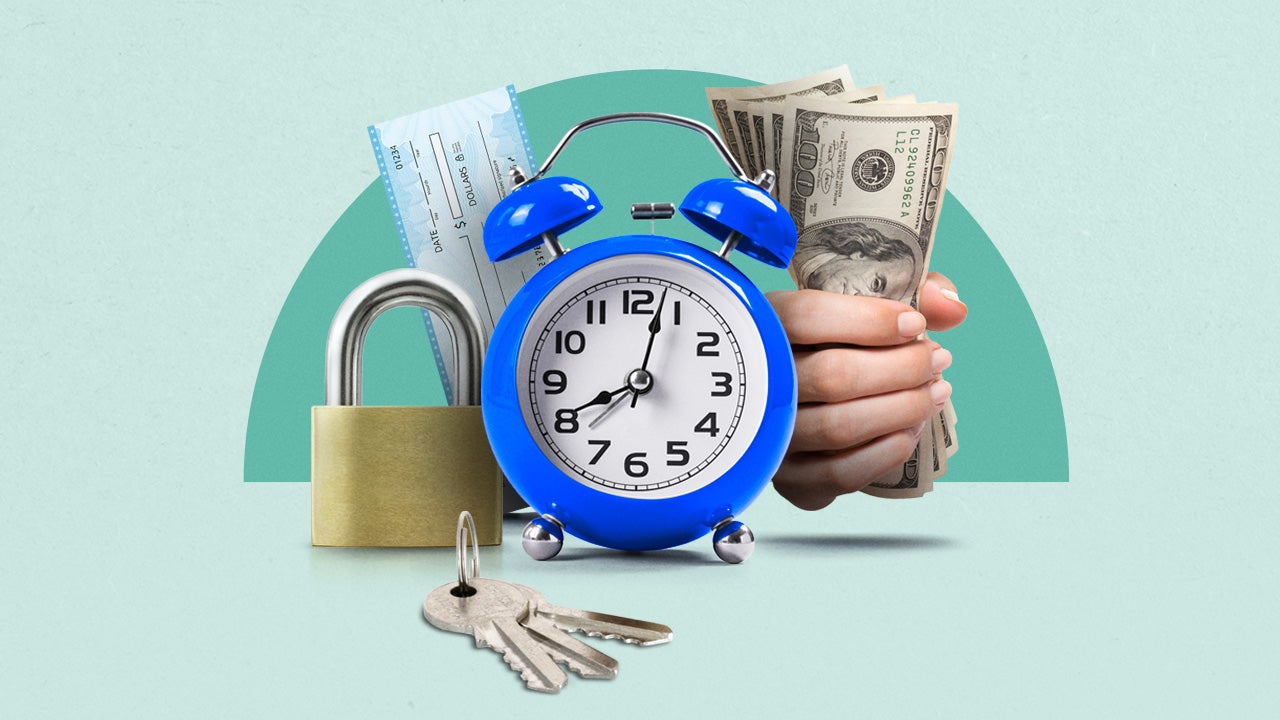Key takeaways
- A CD locks in your money for a set period of time (also known as a term) in exchange for providing a guaranteed yield on the funds.
- CD terms often range from three months to five years, although it’s possible to find term lengths shorter or longer than that. When choosing a term, consider when you’ll need access to the money.
- If you withdraw your money before your CD’s term ends, the bank will likely charge an early withdrawal penalty that eats into the interest (and possibly the principal).
A certificate of deposit (CD) is a type of savings account that earns a fixed interest rate. In exchange for the benefit of this guaranteed yield, you agree to keep your money in the account until the CD’s term ends — also known as the maturity date. CDs are best used for money you won’t need before the term is up. If you do withdraw the money early, the bank will likely charge you a penalty.
How CDs work
CDs work differently to other savings accounts. You usually can’t add money to one after you open it or withdraw the money whenever you want. But you do (usually) get fixed rate of return. Here are all the features of a CD so you can understand how a CD works and determine if one is right for you.
- Term: Every CD has a term, which is the amount of time your money will remain in the account, earning interest. Terms can be as short as one month to as long as 10 years. For instance, if you open a CD with a term of one year, you’ll have access to the money when the CD matures in 12 months. When your term is up, you can choose to renew the CD or withdraw the funds and use them for other purposes.
- Early withdrawal penalty: With most CDs, you’ll pay an early withdrawal penalty if you withdraw the funds before the maturity date. This penalty is calculated based on a set number of days’ worth of interest, and that number can vary based on the bank’s policy and the CD’s term length. For instance, the penalty for a one-year CD could be 180 days of interest, and the penalty for a five-year CD could be 365 days of interest. If you withdraw your money before its earned enough interest to cover the penalty, you’ll have to pay the difference out of your principal.
- APY: The APY is your CD’s rate of return and on most CDs, it’s fixed. This is one of the main advantages of opening a CD compared to a traditional savings account. You can use a CD calculator to calculate exactly how much interest your CD will earn over its term. The higher the CD’s APY, the more total interest it will earn. In exchange for customers leaving their money untouched, a bank may offer higher APYs on its CDs than even the highest-yielding savings accounts.
- Minimum opening deposit: Unlike a savings account, you’re not able to add more funds to a CD once you’ve opened it so you need to already have some money saved to deposit. Some banks don’t require any minimum deposit when you open your CD, while others may require amounts such as $500, $2,500 or more.
- Grace period: When a CD’s term ends, the grace period is a window of time during which you can either withdraw the money or roll it into a new CD. Often, banks provide a grace period between five and 10 days. If you make no changes during the grace period, most banks will automatically roll the balance into a new CD.
Where can you open a CD?
CDs are offered from banks and credit unions, although credit unions often refer to them as share certificates.
You can also purchase a CDs through a brokerage firm. These are bank-issued CDs that are sold on the secondary market through brokerages. Like traditional CDs from banks and credit unions, brokered CDs have term lengths and guaranteed APYs. However, unlike traditional CDs, it’s possible to be able to sell brokered CDs before they mature.
Are CDs FDIC insured?
If an institution issuing CDs is a bank backed by the Federal Deposit Insurance Corp. (FDIC) or a credit union backed by the National Credit Union Share Insurance Fund (NCUSIF), you won’t lose your money in the event the bank or credit union were to fail. FDIC-insured deposits are protected up to $250,000 per depositor, per ownership category, per FDIC-insured bank. Similarly, individual accounts are protected at NCUSIF-insured credit unions up to $250,000 with the same rules.
Why should you consider getting a CD?
A CD can be a good choice when you’re trying to grow already-saved funds for a purchase or expense at a set time in the future — such as purchasing a car or putting a down payment on a home.
Because there’s generally a penalty for making an early withdrawal from a CD, it’s also a good place to store money you want to keep from spending. You may earn more than you would through a standard savings account, too.
However, a CD isn’t the best place for money you’d need in an emergency, such as an unexpected medical bill or car repair. Emergency funds should be kept in a high-yield savings or money market account. What’s more, minimum deposits for CDs can be higher than ones tied to other savings accounts, which may make it more difficult for some to open a CD.
CDs are considered a low-risk investments and though they might earn more than a savings account, they’ll likely earn lower yields than money in the stock market. To earn potentially higher returns (but also incur higher risks, such as the loss of your principal investment), you could research other types of investments.
How much money do I need to open a CD?
Minimum CD deposit requirements vary among banks, with some banks not requiring any set amount.
Some online banks with competitive CDs, like Ally and Synchrony, have no minimum opening deposit requirement.
Meanwhile other online banks, also offering highly competitive rates, require a much bigger upfront deposit. For example, LendingClub requires $2,500 to open a CD and Popular Direct requires $10,000. No matter how much you decide to lock into a CD, it’s vital to devote only money you don’t need for living expenses or emergencies prior.
Build up an emergency fund in a liquid (preferably high-yield) savings account before you focus on committing money to a CD.
Types of CDs
Do some research before deciding which type of CD you should open. While all types of CDs involve stashing money away for a designated term, some CDs come with added features or more flexibility. Some of the different types of CDs are:
- Traditional CDs
-
Traditional CDs, the most common type of CDs, feature a fixed APY and a fixed term. You’ll get hit with a penalty for withdrawing money early.
- No-penalty CDs
-
These CDs, also known as liquid CDs, offer the ability to withdraw money early without paying a penalty. They often have lower rates than traditional CDs with the same term. See Bankrate’s picks for the best no-penalty CDs right now.
- Bump-up CDs
-
If rates rise during the CD term, bump-up CDs give you the option of a rate increase at least once during the CD’s term.
- Step-up CDs
-
Like bump-up CDs, step-up CDs offer the ability to increase your rate in a rising-rate environment. The difference is that step-up CDs usually offer automatic increases at certain intervals.
How to choose a CD
If you think a CD may be right for you, consider these factors when you choose one:
- CD term length. Think about the right term length based on when you’ll want access to the funds. You can time this based on your financial goals, such as when you plan to make a purchase.
- Unique CD features. Occasionally, banks offer specialty CDs that afford some flexibility, such as bump-up CDs that let you boost the rate of the CD if rates rise during its term, or no-penalty CDs that allow you to withdraw the funds early without paying a penalty.
- Minimum deposit. Make sure you can (and want to) meet the minimum amount that’s required for a CD you open.
- Interest rate. Once you’ve decided upon a term length and how much you’d like to deposit, look for a CD with a competitive APY.
- Early withdrawal penalty. While you shouldn’t plan for an early withdrawal, read the early withdrawal penalty of any CD you’re considering. If two CDs are very similar, you might decide to opt for the one with the lower penalty to save you some money should you need to close the CD early.
What happens when a CD matures?
When a CD matures, it enters a grace period, which is when you can withdraw the funds without paying a penalty or tell the bank to renew the CD. Depending on the bank, a CD’s grace period typically lasts between five and 10 days.
If you don’t do anything during the grace period, the bank will likely renew the CD with the same term as the previous one, earning whatever APY the bank is now offering for that term. It’s important to remember your CD’s maturity date, especially if you need the money, because withdrawing the funds after the grace period is over will result in an early withdrawal penalty. Plus, the renewed CD might not earn a competitive yield.
Pros and cons of CDs
Pros
- Federally insured (within limits).
- Federally insured (within limits).
- Fixed interest rate and predictability.
- Fixed interest rate and predictability.
- Higher APYs than traditional savings or money market accounts.
- Higher APYs than traditional savings or money market accounts.
Cons
- Lack of liquidity.
- Lack of liquidity.
- Penalty for withdrawing money before the maturity date.
- Penalty for withdrawing money before the maturity date.
- Risk that rates on new CDs will go up during your CD’s term.
- Risk that rates on new CDs will go up during your CD’s term.
- Lower returns than other types of investments, like stocks (but also a lot less risk).
- Lower returns than other types of investments, like stocks (but also a lot less risk).
CDs vs. savings accounts
CDs and traditional savings accounts both help you save money and earn interest, although each can be useful for different purposes. While everyone should have a savings account for emergency purposes, not everyone needs a CD.
- Savings accounts are a better place for funds you might need to access at a moment’s notice. That’s because you can often withdraw money from a savings account without a fee. This makes savings accounts good for holding an emergency fund or money for short-term goals.
- CDs can be a better place for funds you don’t want to spend (or need) in the near future. Because you lock the funds in, a CD can help keep you from spending money on impulse purchases.
- CDs are for depositing money you’ve already saved, whereas you can build up your savings in a regular savings account over time. Usually, you can’t add money to a CD after making your initial deposit, while you can add to a savings account over the months and years.
- Savings account APYs are variable and can change over time, whereas CDs earn a fixed APY. Having a variable rate can be advantageous at a time when rates are increasing, while having a fixed rate can be better when rates are falling.
How to build a CD ladder
If you want to open a CD but are not sure which CD term length is right for you, consider a CD ladder. A CD latter is a strategy in which you open multiple CDs at once with different maturity lengths. This way, you can benefit from competitive APYs on longer-term CDs, while freeing up some of your money sooner with shorter-term CDs.
When opening a CD ladder, decide how much you’d like to save and how often you want money to become available from the matured CDs.
For example, let’s say you want to build a five-year ladder with five rungs. If you have $5,000 to invest, you could place $1,000 in each rung. It would look like this:
With this setup, a CD would mature each year. When each CD matures, you could choose to extend the ladder by reinvesting the money in a new CD, or you could choose to use the money for planned expenses or other investments.
Use Bankrate’s CD ladder calculator to help build a CD ladder that fits your budget and timeline.
FAQs about certificates of deposit
Bottom line
Overall, CDs are safe investments that offer a guaranteed rate of return. You have to keep your money locked up for a set period of time, but in exchange, you may get a higher rate than you would with a traditional savings or money market account.
In a high-rate environment, the reward for saving your money in a CD is even greater, and you’re guaranteed to earn that high rate for the duration of the term.
Read the full article here















